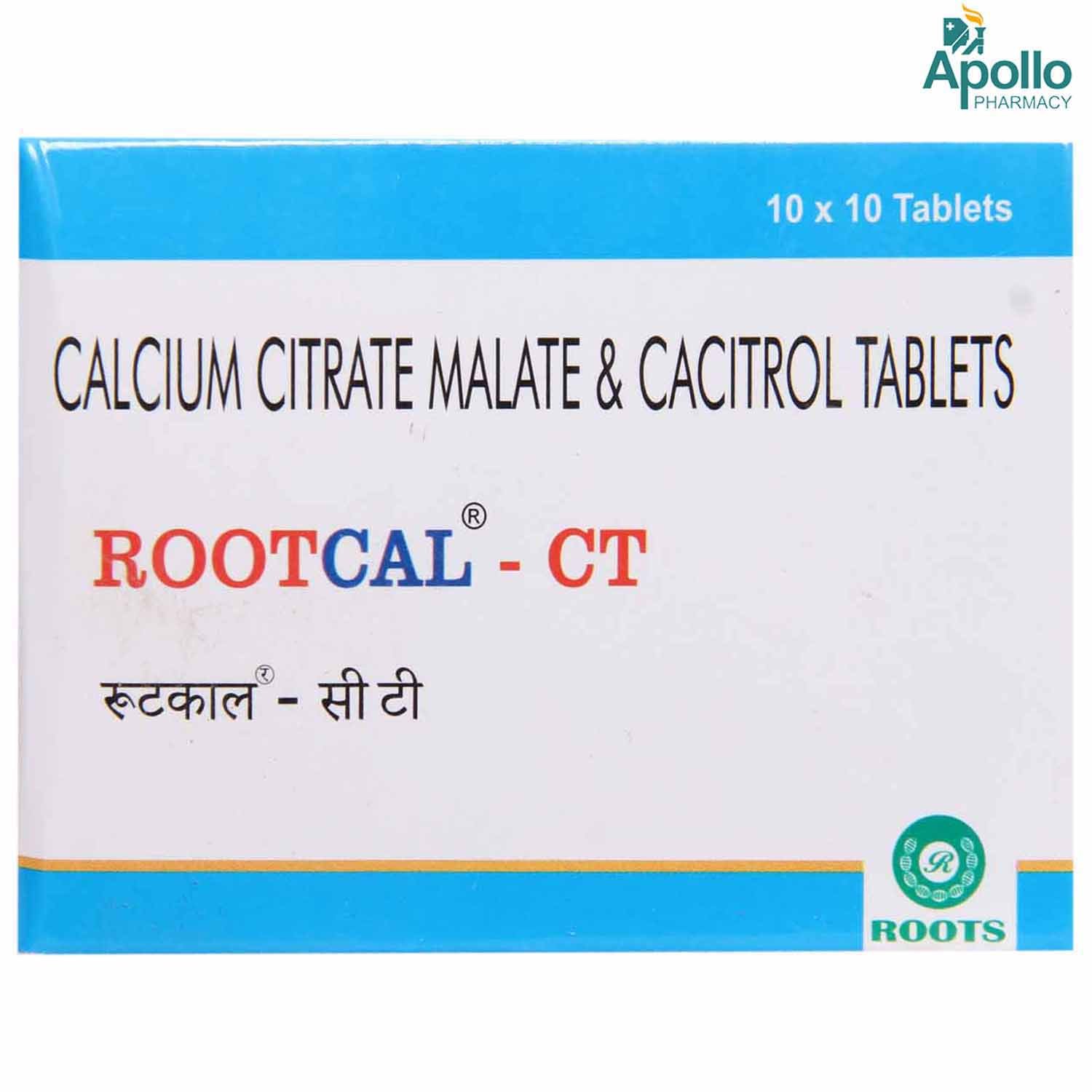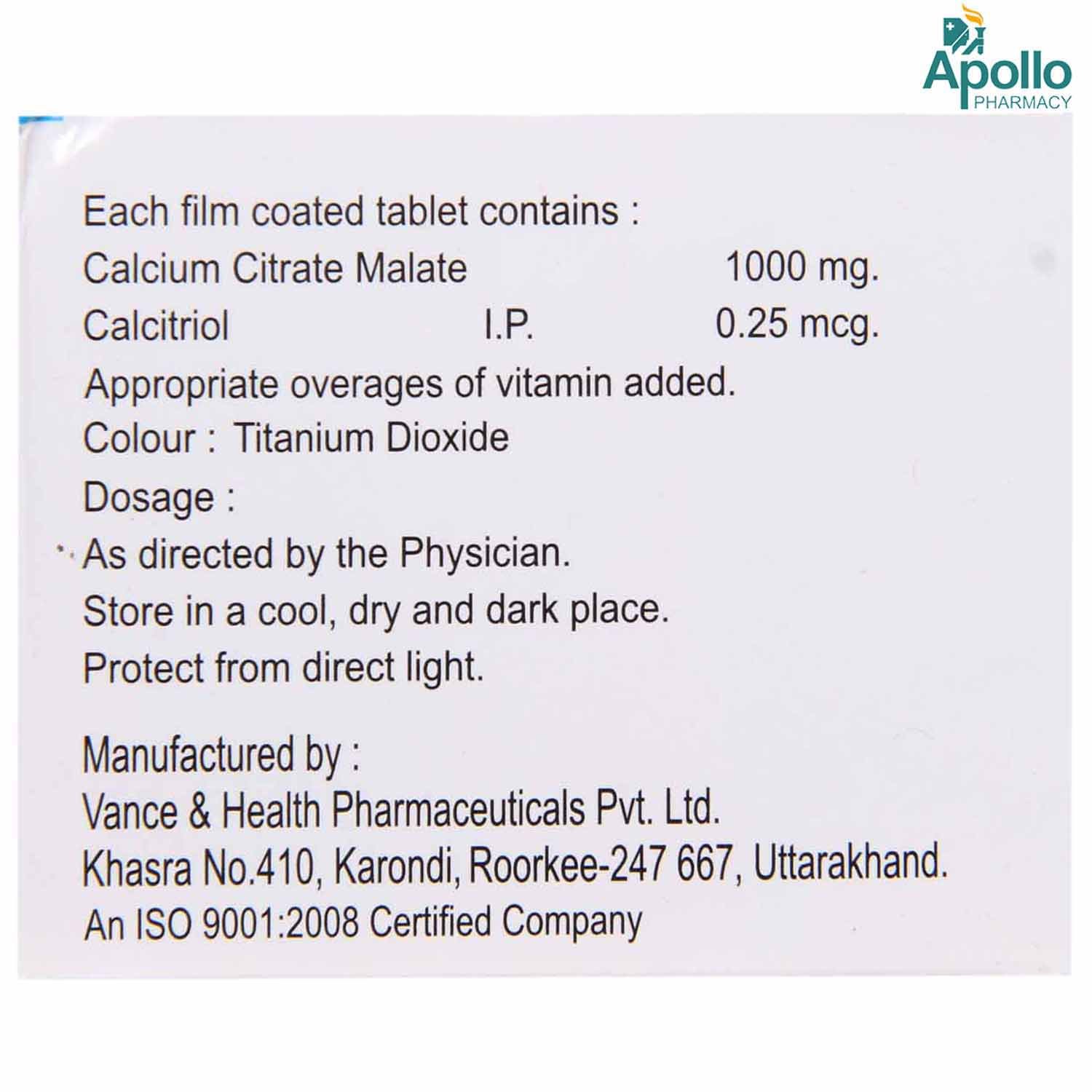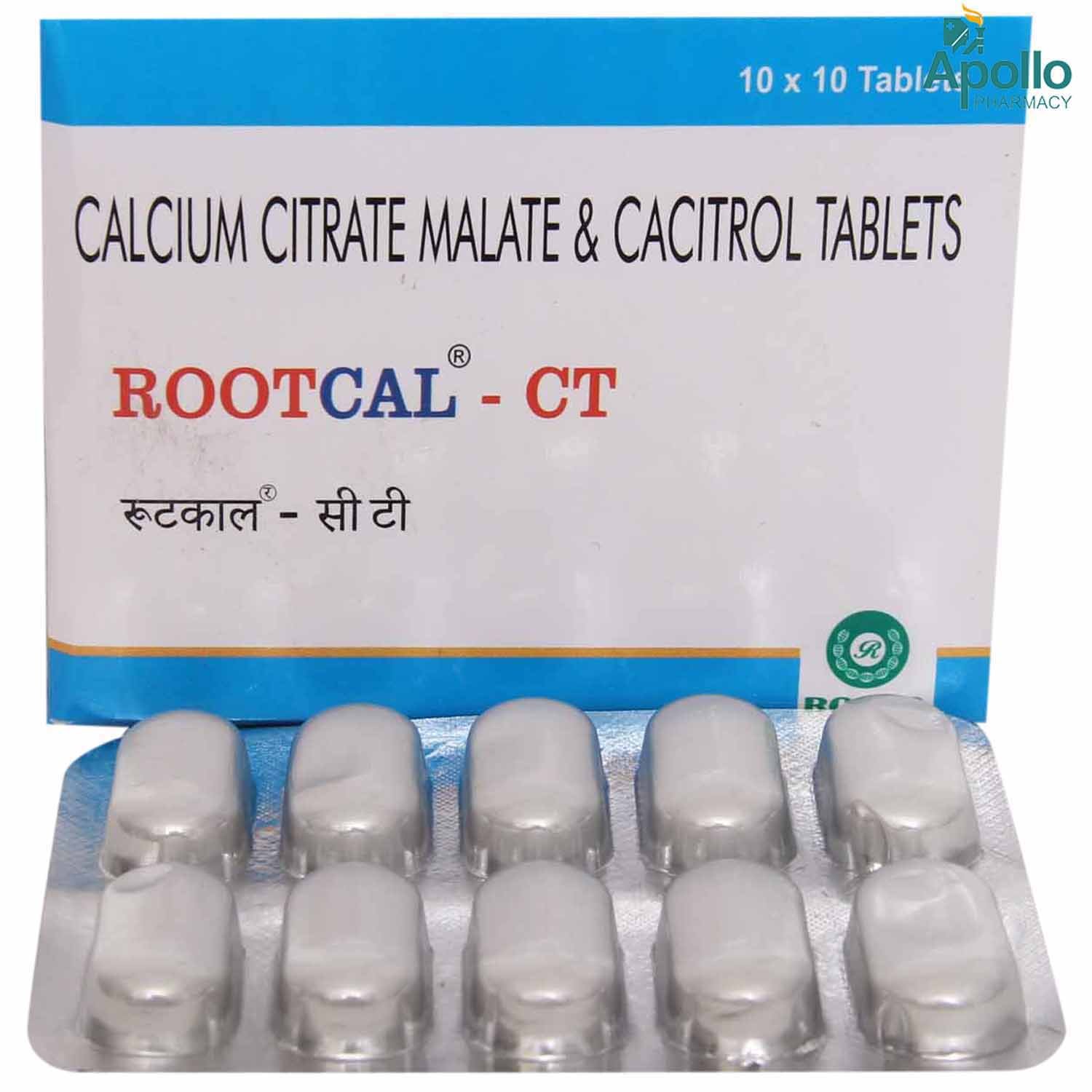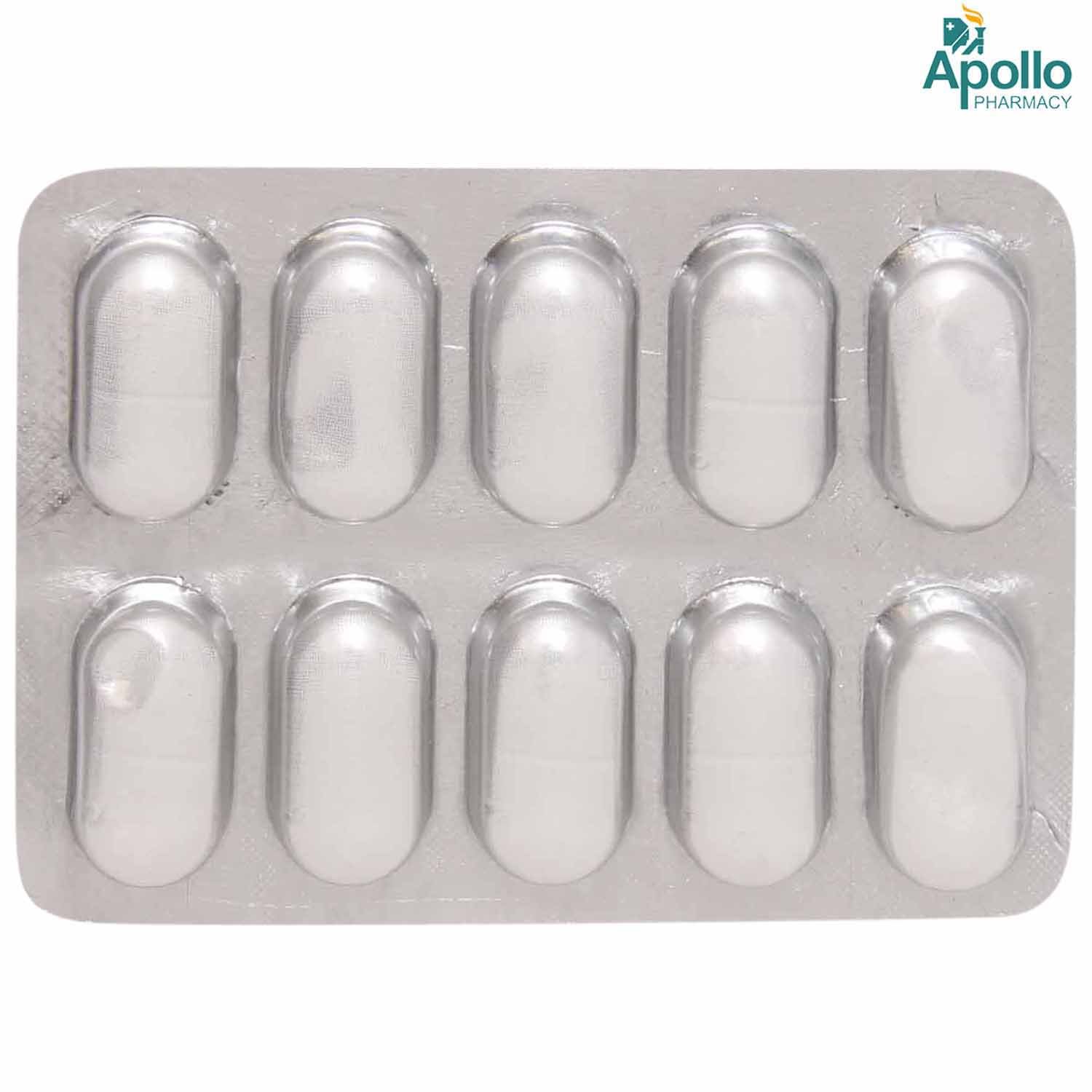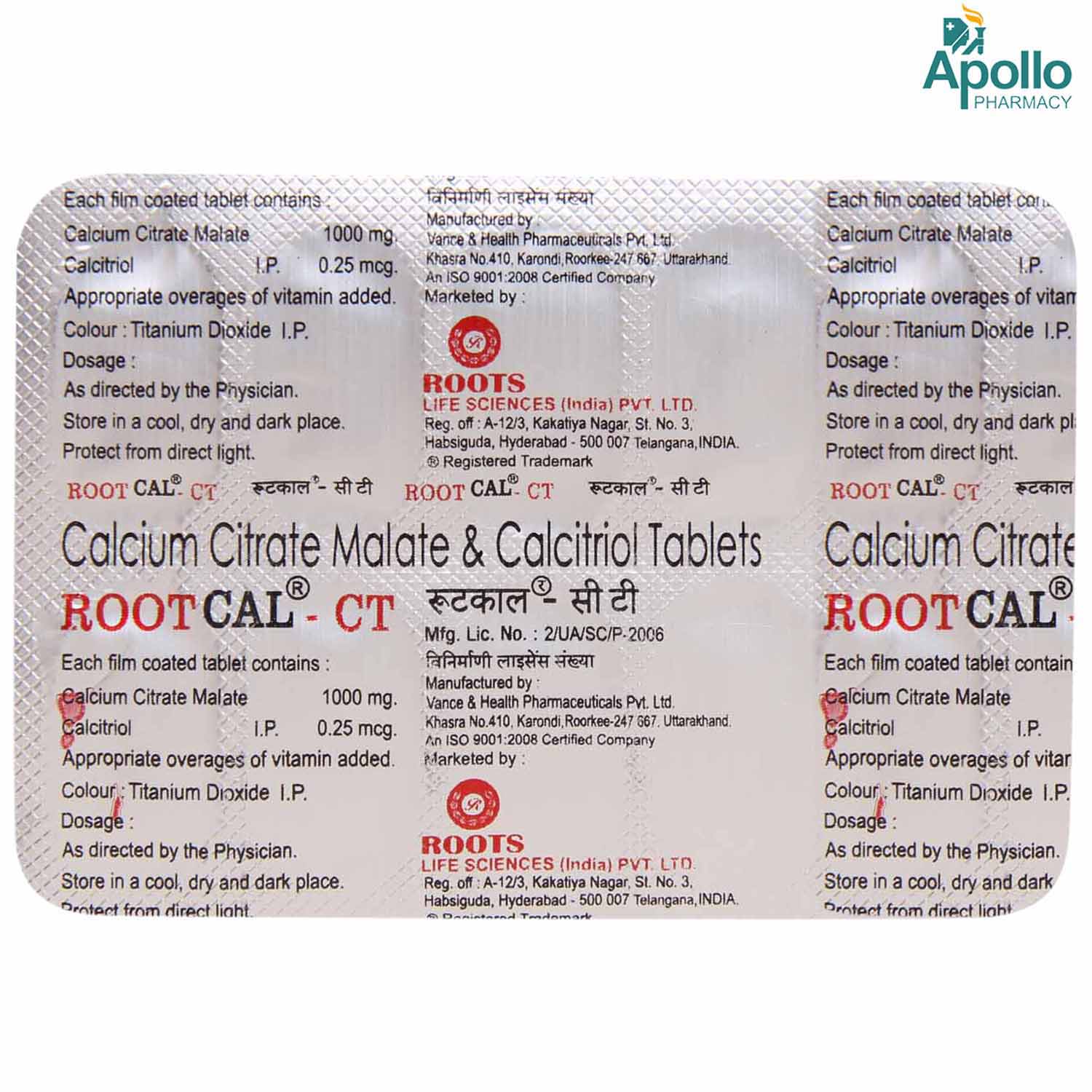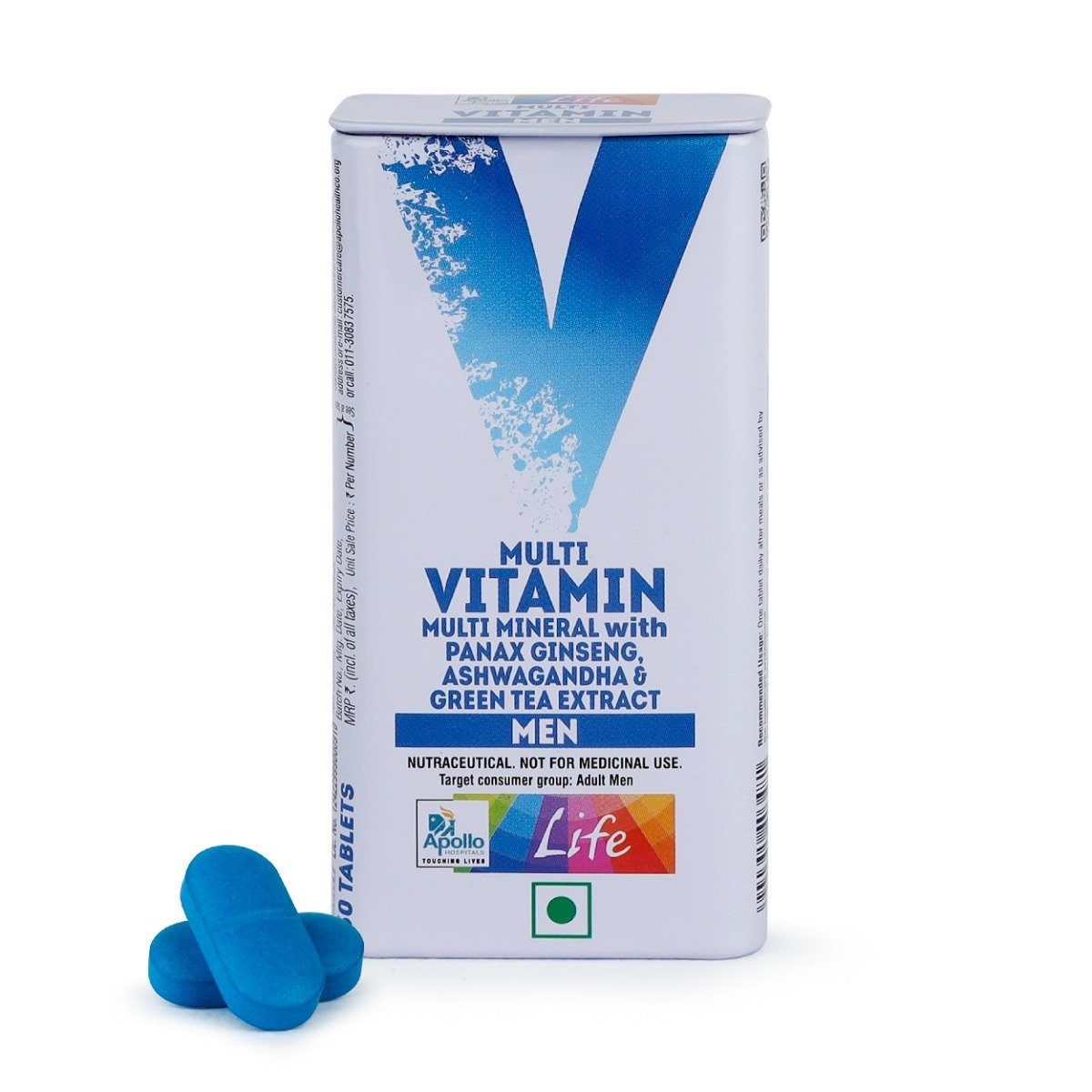Rootcal-CT Tablet 10's
MRP ₹168.5
(Inclusive of all Taxes)
₹25.3 Cashback (15%)
About Rootcal-CT Tablet
Rootcal-CT Tablet belongs to the class of 'vitamins,' primarily used to treat various conditions caused by low calcium levels in the body like Vitamin D deficiency, osteoporosis (weak and brittle bones), hypoparathyroidism (a condition in which parathyroid glands make low levels of calcium in the body), latent tetany (a muscle disease with low blood calcium levels), and rickets or osteomalacia (softening or deforming of bones due to lack of calcium).
Rootcal-CT Tablet consists of calcium and calcitriol (vitamin D). Calcium is a mineral that is used to prevent or treat a calcium deficiency. It provides essential nutrients to maintain bone formation. Calcitriol is a synthetic form of vitamin D that helps maintain blood calcium and phosphorus levels and mineralization of bone.
Rootcal-CT Tablet is likely safe to use. In some cases, it may cause side effects like constipation and stomach upset. These side effects do not require medical attention and gradually resolve over time. However, if the side effects persist or worsen, please consult a doctor.
Let your doctor know if you are using any other medicine, or herbal products before starting Rootcal-CT Tablet . Please inform your doctor if you have hypercalcemia (high calcium levels), hypervitaminosis D (high vitamin D levels), malabsorption syndrome (difficulty absorbing nutrition from food), low levels of bile, and phosphate imbalance before starting Rootcal-CT Tablet . If you are pregnant or breastfeeding, consult your doctor before taking Rootcal-CT Tablet .
Country of origin
Manufacturer/Marketer address
Online payment accepted

secured payment

india's most trusted pharmacy

genuine products
Composition :
Manufacturer/Marketer :
Consume Type :
Expires on or after :
Return Policy :
Provide Delivery Location
About Rootcal-CT Tablet
Rootcal-CT Tablet belongs to the class of 'vitamins,' primarily used to treat various conditions caused by low calcium levels in the body like Vitamin D deficiency, osteoporosis (weak and brittle bones), hypoparathyroidism (a condition in which parathyroid glands make low levels of calcium in the body), latent tetany (a muscle disease with low blood calcium levels), and rickets or osteomalacia (softening or deforming of bones due to lack of calcium).
Rootcal-CT Tablet consists of calcium and calcitriol (vitamin D). Calcium is a mineral that is used to prevent or treat a calcium deficiency. It provides essential nutrients to maintain bone formation. Calcitriol is a synthetic form of vitamin D that helps maintain blood calcium and phosphorus levels and mineralization of bone.
Rootcal-CT Tablet is likely safe to use. In some cases, it may cause side effects like constipation and stomach upset. These side effects do not require medical attention and gradually resolve over time. However, if the side effects persist or worsen, please consult a doctor.
Let your doctor know if you are using any other medicine, or herbal products before starting Rootcal-CT Tablet . Please inform your doctor if you have hypercalcemia (high calcium levels), hypervitaminosis D (high vitamin D levels), malabsorption syndrome (difficulty absorbing nutrition from food), low levels of bile, and phosphate imbalance before starting Rootcal-CT Tablet . If you are pregnant or breastfeeding, consult your doctor before taking Rootcal-CT Tablet .
Uses of Rootcal-CT Tablet
Key Benefits
Rootcal-CT Tablet is used to treat low blood calcium levels. It effectively treats various conditions caused by low calcium levels in the body like vitamin D deficiency, osteoporosis, hypoparathyroidism, latent tetany, and rickets or osteomalacia. Rootcal-CT Tablet consists of two medicines: Calcium (mineral) and Calcitriol (Vitamin D). Calcium is a mineral that is used to prevent or treat a calcium deficiency. It provides essential nutrients to maintain bone formation. Calcitriol is a steroid hormone produced in the skin when exposed to ultraviolet light or obtained from food sources. It helps maintain blood calcium and phosphorus levels and mineralization of bone.
Directions for Use
Storage
Side Effects of Rootcal-CT Tablet
- Constipation
- Stomach upset
- Nausea/vomiting
- Bone/muscle pain
- Fast or pounding heartbeat
- Headache
Drug Warnings
If you are allergic to Rootcal-CT Tablet or any other medicines, please tell your doctor. If you are pregnant or planning to become pregnant, it is advised to inform your doctor before using Rootcal-CT Tablet . Consult your doctor if you are pregnant or breastfeeding. Rootcal-CT Tablet is not recommended if you have hypercalcemia (high calcium levels), metastatic calcification (extra deposits of calcium in the body), hypervitaminosis D (high vitamin D levels), and malabsorption syndrome (difficulty absorbing nutrition from food). Inform your doctor before taking Rootcal-CT Tablet if you have any heart/kidney/liver/blood vessel diseases, kidney stones, sarcoidosis (growth of inflammatory cells in different parts of the body), Crohn's disease (inflammatory bowel disease), Whipple's disease (bacterial infection affecting joints and digestive system), achlorhydria (little or no stomach acid), low levels of bile, and phosphate imbalance. Rootcal-CT Tablet may contain sugar or sorbitol; hence caution should be taken in case of intolerance to sugars, diabetes, and phenylketonuria (increased levels of an amino acid called phenylalanine).
Drug Interactions
Drug-Drug Interactions: Rootcal-CT Tablet may interact with drugs treating high cholesterol levels (cholestyramine, colesevelam, colestipol), antibiotics (doxycycline, minocycline, ciprofloxacin, levofloxacin, penicillin, neomycin, and chloramphenicol), anti-cancer drugs (estramustine), drugs treating bone loss (alendronate sodium), hormone (levothyroxine), weight-loss drugs (orlistat), fits medicines (phenobarbital), mineral oils (paraffin), water pills (furosemide, ethacrynic acid), and heart-related medicines (digitoxin).
Drug-Food Interactions: Avoid or reduce caffeine intake, soft drinks, and alcohol, as they might inhibit calcium absorption.
Drug-Disease Interactions: Brief your doctor if your children have a medical history of allergic reactions, cardiovascular adverse effects, phosphate calcifications, cardiac contraction/conduction, malabsorption, renal dysfunction, sarcoidosis, arrhythmia, electrolyte imbalance, hypercalcemia, renal dysfunction, and hepatobiliary dysfunction.
Drug-Drug Interactions Checker List
- CHOLESTYRAMINE
- COLESEVELAM
- COLESTIPOL
- DOXYCYCLINE
- MINOCYCLINE
- CIPROFLOXACIN
- LEVOFLOXACIN
- PENICILLIN
- NEOMYCIN
- CHLORAMPHENICOL
- ESTRAMUSTINE
- ALENDRONATE SODIUM
- LEVOTHYROXINE
- ORLISTAT
- PHENOBARBITAL
- FUROSEMIDE
- ETHACRYNIC ACID
- DIGITOXIN
- PARAFFIN
Habit Forming
Diet & Lifestyle Advise
- Include dairy products like milk, yoghurt, cheese, or milk-based custard in children's diets.
- Eat daily a serving of broccoli, cabbage, spinach, and other green leafy vegetables.
- Include the best dietary sources of vitamin D, such as fish liver oils and vitamin D–fortified milk.
- Snack on calcium-rich nuts like Brazil nuts or almonds.
- Sprinkle sesame seeds over your food, vegetables, and salads. Sesame seeds are high in calcium.
- Avoid or reduce the intake of caffeine, soft drinks, and alcohol that inhibit calcium absorption.
- Replace the meat with tofu or tempeh for extra calcium in your children's meals.
Special Advise
Rootcal-CT Tablet may interfere with cholesterol tests. Hence please inform your doctor and laboratory staff that you are using Rootcal-CT Tablet before undergoing blood tests.
Disease/Condition Glossary
Vitamin D deficiency: When a person cannot get enough Vitamin D through food and exposure to sunlight, it leads to vitamin D deficiency. It often leads to thin, brittle, or misshapen bones.
Osteoporosis: Osteoporosis is a bone disease that weakens brittle bones by decreasing bone density.
Tetany: It is a disease condition caused due to low calcium levels (hypocalcemia) in the body that causes cramps and spasms in the hands, feet, and larynx (voice box).
Osteomalacia/Rickets: A disease caused by softening and weakening bones in children due to inadequate vitamin D.
Hypoparathyroidism: It is a disease characterized by low parathyroid hormone levels. This can cause low calcium levels and trigger tetany (muscle cramps, spasms, or tremors).
FAQs
Disclaimer
Alcohol
Safe if prescribed
Drinking alcohol can affect calcium absorption; hence, limit alcohol consumption while using Rootcal-CT Tablet .
Pregnancy
Consult your doctor
Consult your doctor if you are pregnant. Your doctor will weigh the potential risks and benefits before recommending this medicine.
Breast Feeding
Consult your doctor
Consult your doctor before taking Rootcal-CT Tablet if you are breastfeeding. Rootcal-CT Tablet can pass into the breast milk. If this medicine is used during breastfeeding, monitoring the serum calcium levels of the mother and the infant is required.
Driving
Safe if prescribed
Rootcal-CT Tablet usually does not affect your ability to drive. However, if you experience any unmanageable side effects while using it, avoid driving or operating machinery.
Liver
Consult your doctor
Consult your doctor if you have any history of liver diseases before taking Rootcal-CT Tablet . Hepatic impairment/liver disease can alter the metabolism and therapeutic activity of certain Vitamin D forms.
Kidney
Consult your doctor
You should seek a doctor's advice before starting Rootcal-CT Tablet if you have kidney diseases like kidney stones or undergoing dialysis. Be cautious if you are undergoing dialysis to maintain adequate phosphorus levels and avoid ectopic calcification (calcium deposition).
Children
Safe if prescribed
Please consult your doctor. Your doctor will recommend a suitable dose based on your child's age, body weight and condition.
Author Details
We provide you with authentic, trustworthy and relevant information
Uses of Rootcal-CT Tablet
Key Benefits
Rootcal-CT Tablet is used to treat low blood calcium levels. It effectively treats various conditions caused by low calcium levels in the body like vitamin D deficiency, osteoporosis, hypoparathyroidism, latent tetany, and rickets or osteomalacia. Rootcal-CT Tablet consists of two medicines: Calcium (mineral) and Calcitriol (Vitamin D). Calcium is a mineral that is used to prevent or treat a calcium deficiency. It provides essential nutrients to maintain bone formation. Calcitriol is a steroid hormone produced in the skin when exposed to ultraviolet light or obtained from food sources. It helps maintain blood calcium and phosphorus levels and mineralization of bone.
- Stay hydrated by drinking plenty of water.
- Avoid dairy product such as cheese, milk, yogurt and ice cream.
- Maintain healthy weight and exercise daily.
- Following a low-calcium diet can help reduce hypercalcemia symptoms.
- Reduce sodium intake to minimize calcium excretion in urine.
- Limit animal protein consumption to decrease urinary calcium levels.
- Increase fluid intake by drinking plenty of water to dilute urine.
- Moderate calcium intake based on individual needs, avoiding drastic restriction.
- Limit oxalate-rich foods like spinach and chocolate to minimize kidney stone formation.
- Stay hydrated by drinking plenty of water.
- Consider reducing vitamin D supplementation if excessive intake is contributing to hypercalciuria.
- Regularly monitor urine calcium levels through 24-hour urine tests.
- Always seek guidance from a healthcare expert prior to implementing substantial changes to your diet or lifestyle routine.
- Inform your doctor about the medication you're taking and the UTI symptoms you're experiencing.
- Your doctor may adjust your medication regimen or consider alternative medications or dosages that may reduce the risk of UTIs.
- Drink plenty of water (at least 8-10 glasses a day) to help flush out bacteria. Avoid sugary drinks and caffeine, which can exacerbate UTI symptoms.
- Urinate when you feel the need rather than holding it in. This can help prevent bacterial growth and reduce the risk of UTIs.
- Consider cranberry supplements: Cranberry supplements may help prevent UTIs by preventing bacterial adhesion.
- Monitor UTI symptoms and report any changes to your doctor.
- If antibiotics are prescribed, take them as directed and complete the full course.
- Hydrate your body: Drink enough water to prevent dehydration and headaches.
- Calm Your Mind: Deep breathing and meditation can help you relax and relieve stress.
- Rest and Recharge: Sleep for 7-8 hours to reduce headache triggers.
- Take rest: lie down in a quiet, dark environment.
- Cold or warm compresses can help reduce tension.
- Stay Upright: Maintain good posture to keep symptoms from getting worse.
- To treat headaches naturally, try acupuncture or massage therapy.
- Over-the-counter pain relievers include acetaminophen and ibuprofen.
- Prescription Assistance: Speak with your doctor about more substantial drug alternatives.
- Severe Headaches: Seek emergency medical assistance for sudden, severe headaches.
- Frequent Headaches: If you get reoccurring headaches, consult your doctor.
- Headaches with Symptoms: Seek medical attention if your headaches include fever, disorientation, or weakness.
- Drink water or other clear fluids.
- To prevent worsening of pain, limit intake of tea, coffee, or alcohol.
- Include bland foods like rice, toast, crackers, and rice in your diet.
- Avoid lying down immediately after eating as it may cause indigestion or heartburn.
- Avoid acidic and spicy food as it may cause indigestion.
- Inform your doctor about the nausea and discuss possible alternatives to the medication or adjustments to the dosage.
- Divide your daily food intake into smaller, more frequent meals to reduce nausea.
- Opt for bland, easily digestible foods like crackers, toast, plain rice, bananas, and applesauce.
- Avoid certain foods that can trigger nausea, such as fatty, greasy, spicy, and smelly foods.
- Drink plenty of fluids, such as water, clear broth, or electrolyte-rich beverages like coconut water or sports drinks.
- Use ginger (tea, ale, or candies) to help relieve nausea.
- Get adequate rest and also avoid strenuous activities that can worsen nausea.
- Talk to your doctor about taking anti-nausea medication if your nausea is severe.
- Record when your nausea occurs, what triggers it, and what provides relief to help you identify patterns and manage your symptoms more effectively.
- Skin rash caused by allergies is due to irritants or allergens. Therefore, avoid contact with such irritants.
- Consult your doctor for proper medication and apply an anti-itch medication. Follow the schedule and use the medication whenever needed.
- Protect your skin from extreme heat and try to apply wet compresses.
- Soak in the cool bath, which gives a soothing impact to the affected area.
Directions for Use
Storage
Drug Warnings
If you are allergic to Rootcal-CT Tablet or any other medicines, please tell your doctor. If you are pregnant or planning to become pregnant, it is advised to inform your doctor before using Rootcal-CT Tablet . Consult your doctor if you are pregnant or breastfeeding. Rootcal-CT Tablet is not recommended if you have hypercalcemia (high calcium levels), metastatic calcification (extra deposits of calcium in the body), hypervitaminosis D (high vitamin D levels), and malabsorption syndrome (difficulty absorbing nutrition from food). Inform your doctor before taking Rootcal-CT Tablet if you have any heart/kidney/liver/blood vessel diseases, kidney stones, sarcoidosis (growth of inflammatory cells in different parts of the body), Crohn's disease (inflammatory bowel disease), Whipple's disease (bacterial infection affecting joints and digestive system), achlorhydria (little or no stomach acid), low levels of bile, and phosphate imbalance. Rootcal-CT Tablet may contain sugar or sorbitol; hence caution should be taken in case of intolerance to sugars, diabetes, and phenylketonuria (increased levels of an amino acid called phenylalanine).
Therapeutic Class
Drug-Drug Interactions
Drug-Drug Interactions
Login/Sign Up
Co-administration of Rootcal-CT Tablet with Dihydroxyaluminum sodium carbonate may increase the effects of Dihydroxyaluminum sodium carbonate, which could result in too high aluminum blood levels.
How to manage the interaction:
Although there is an interaction, Rootcal-CT Tablet can be used with Dihydroxyaluminum sodium carbonate if prescribed by the doctor. However, maintain a gap of 2-3 hours between both medicines. Do not discontinue the medication without consulting a doctor.
Co-administration of Dolutegravir with Rootcal-CT Tablet can reduce the effectiveness of dolutegravir.
How to manage the interaction:
Although there is an interaction, Rootcal-CT Tablet can be used with Dolutegravir if prescribed by the doctor. However, take dolutegravir at least two hours before or six hours after Rootcal-CT Tablet. Do not discontinue the medication without consulting a doctor.
Co-administration of Rootcal-CT Tablet with Aluminum hydroxide may increase the effects of aluminum hydroxide, which could result in too high aluminum blood levels.
How to manage the interaction:
Although there is an interaction, Rootcal-CT Tablet can be used with aluminum hydroxide if prescribed by the doctor. However, maintain a gap of 2-3 hours between both medicines. Do not discontinue the medication without a doctor's advice.
Co-administration of Paricalcitol and Rootcal-CT Tablet are forms of vitamin D, and taking too much vitamin D may lead to toxic effects related to excessive calcium levels in the blood and urine.
How to manage the interaction:
Concomitant use of Paricalcitol with Rootcal-CT Tablet can lead to an interaction, it can be taken if advised by a doctor. Consult the prescriber if you experience symptoms of vitamin D intoxication such as weakness, fatigue, headache, vertigo, drowsiness, ringing in the ears, loss of appetite, nausea, vomiting, constipation, dry mouth, metallic taste, muscle pain, bone pain, muscle incoordination, and low muscle tone. Do not discontinue the medication without consulting a doctor.
Co-administration of Rootcal-CT Tablet with Dihydrotachysterol can increase the risk of adverse effects.
How to manage the interaction:
Co-administration of Dihydrotachysterol with Rootcal-CT Tablet can possibly result in an interaction, but it can be taken if your doctor has advised it. If you notice any of these symptoms - irregular heartbeat, seizures, weakness, tiredness, headache, dizziness, ringing in the ears, loss of appetite, feeling sick, throwing up, constipation, dry mouth, strange taste in your mouth, muscle or bone pain, trouble coordinating movements, weak muscles, peeing a lot, feeling very thirsty, losing weight, eye infection, sensitivity to light, itching, or a higher body temperature - make sure to call a doctor right away. Do not discontinue any medications without consulting a doctor.
Co-administration of Orlistat with Rootcal-CT Tablet may reduce the levels of Rootcal-CT Tablet which can lead to low treatment outcomes.
How to manage the interaction:
Although there is an interaction, Rootcal-CT Tablet can be taken with Orlistat when prescribed by the doctor. Do not discontinue any medications without consulting a doctor.
Co-administration of Metolazone with Rootcal-CT Tablet can cause blood calcium levels to become too high.
How to manage the interaction:
Although there is an interaction, Rootcal-CT Tablet can be taken with metolazone if prescribed by the doctor. Consult the doctor if you experience symptoms such as dizziness, drowsiness, weakness, lethargy, headache, nausea, vomiting, or seizures. Do not discontinue the medication without consulting a doctor.
Co-administration of Rootcal-CT Tablet with Digitoxin may increase the risk or severity of digitoxin toxicity and irregular heart rhythm.
How to manage the interaction:
Although there is an interaction, Rootcal-CT Tablet can be taken with Digitoxin if prescribed by the doctor. Consult the prescriber if you experience symptoms that could indicate high blood calcium, such as weakness, fatigue, headache, dizziness, drowsiness, ringing in the ears, loss of appetite, nausea, vomiting, constipation, dry mouth, a metallic taste in the mouth, bone or muscle pain, incoordination, frequent urination, and weight loss. Also, seek medical attention if you experience symptoms of digitoxin toxicity, such as blurred vision, slow pulse, or irregular heartbeats. Do not discontinue the medication without consulting a doctor.
Co-administration of Rootcal-CT Tablet and Burosumab may cause increases in phosphorus and vitamin D levels in the blood, which may lead to an increased risk of kidney stones.
How to manage the interaction:
There may be a possibility of interaction between Rootcal-CT Tablet and Burosumab, but it can be taken if prescribed by a doctor. If you have any of these symptoms like kidney stones, it's important to contact a doctor right away. Do not stop using any medications without a doctor's advice. Do not discontinue the medication without consulting a doctor.
Co-administration of Isoniazid with Rootcal-CT Tablet may decrease the effects of Rootcal-CT Tablet.
How to manage the interaction:
Although there is an interaction, Rootcal-CT Tablet can be taken with isoniazid if prescribed by the doctor. Do not stop using any medications without talking to a doctor. Do not discontinue the medication without consulting a doctor.
Drug-Drug Interactions Checker List
- CHOLESTYRAMINE
- COLESEVELAM
- COLESTIPOL
- DOXYCYCLINE
- MINOCYCLINE
- CIPROFLOXACIN
- LEVOFLOXACIN
- PENICILLIN
- NEOMYCIN
- CHLORAMPHENICOL
- ESTRAMUSTINE
- ALENDRONATE SODIUM
- LEVOTHYROXINE
- ORLISTAT
- PHENOBARBITAL
- FUROSEMIDE
- ETHACRYNIC ACID
- DIGITOXIN
- PARAFFIN
Diet & Lifestyle Advise
- Include dairy products like milk, yoghurt, cheese, or milk-based custard in children's diets.
- Eat daily a serving of broccoli, cabbage, spinach, and other green leafy vegetables.
- Include the best dietary sources of vitamin D, such as fish liver oils and vitamin D–fortified milk.
- Snack on calcium-rich nuts like Brazil nuts or almonds.
- Sprinkle sesame seeds over your food, vegetables, and salads. Sesame seeds are high in calcium.
- Avoid or reduce the intake of caffeine, soft drinks, and alcohol that inhibit calcium absorption.
- Replace the meat with tofu or tempeh for extra calcium in your children's meals.
Habit Forming
Side Effects of Rootcal-CT Tablet
- Constipation
- Stomach upset
- Nausea/vomiting
- Bone/muscle pain
- Fast or pounding heartbeat
- Headache
Special Advise
Rootcal-CT Tablet may interfere with cholesterol tests. Hence please inform your doctor and laboratory staff that you are using Rootcal-CT Tablet before undergoing blood tests.
Disease/Condition Glossary
Vitamin D deficiency: When a person cannot get enough Vitamin D through food and exposure to sunlight, it leads to vitamin D deficiency. It often leads to thin, brittle, or misshapen bones.
Osteoporosis: Osteoporosis is a bone disease that weakens brittle bones by decreasing bone density.
Tetany: It is a disease condition caused due to low calcium levels (hypocalcemia) in the body that causes cramps and spasms in the hands, feet, and larynx (voice box).
Osteomalacia/Rickets: A disease caused by softening and weakening bones in children due to inadequate vitamin D.
Hypoparathyroidism: It is a disease characterized by low parathyroid hormone levels. This can cause low calcium levels and trigger tetany (muscle cramps, spasms, or tremors).
All Substitutes & Brand Comparisons

Have a query?

